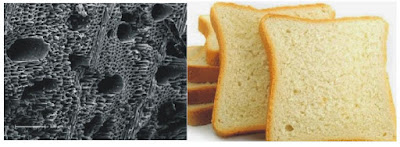..... And you see the earth dried up at first, then when We send down water upon it, live the earth, and be the land, and grow all kinds of beautiful plants. "- (QS 22: 5)
Soil is a medium for the growth of plants, more specialized crops that are cultivated by humans to meet their needs through agriculture / plantation and forestry. Good soil will produce high quality agricultural products with a large quantity. But getting the ideal soil especially for the farming business is not an easy thing nowadays because of several things. First the destruction of the soil due to the use of chemical fertilizers that turned out to be in the long run damaged the soil, as experienced by most agricultural land today. The second factor is the limitation of land due to its massive use of land for housing, industry and so on. The third factor is irresponsible farming such as mobile agriculture. The fourth factor is human effort to take irresponsible natural resources as commonly happened in mining, illegal logging and so on. Any farming business also begins with recognizing the type of land and its character, it shows how important the land is.
Chemical fertilizers mainly as the biggest and main cause of the damage for current agricultural lands. This is because chemical fertilizers cause physical, chemical and biological damage to the soil. The soil becomes hard, lacks nutrients (barren) and the death of soil microbes. The death of soil microbes is the source of the biggest problem causing the damage to the soil. This is because soil microbes play an important role to continue to maintain soil fertility. A handful of fertile soil contains 2 billion microbes that run each other prey and fight over food in the ground. The activity of running microbes that prey on each other in the soil, causing the ground to vibrate and become hollow. Hollow soil is loosening and improving soil aeration that also helps to fertilize the soil. The presence of water entering the soil will be absorbed by the plants as well as the needs of these microbes. Why chemical fertilizers should be avoided? This is because chemical fertilizers make acid soil that kills the soil microbes, so the consequences are very fatal. The synthesis or decomposition of organic materials also involves these microbial activities.
The ideal soil is fertile, with parable like white bread,soft and hollow. Soft and hollow because of the soil microbial activity that forms the structure and cavity. These conditions make optimal plant growth because the roots can freely absorb nutrients in the soil for growth. The reverse is barren land, with a metaphor like the pathetic bread, which is hard and solid. Hard and solid due to the absence or lack of microbes in the soil. These conditions make plant growth disturbed and will not be optimal. Water also will not be well absorbed in the soil condition. Well, what if the cavities or pores in the soil are reproduced and even made a special house for microbes? Of course microbial activity is getting bigger and growing. "White bread" is even more tender and hollow / porous. Does the cavity or pore serve only as a microbial house? Apparently not. The cavities or pores also improve the soil structure of aeration and are also able to withstand the soil nutrients from loss due to leaching / washing.
Furthermore, the pores are also able to absorb CO2 gas from the atmosphere. CO2 gas is one of the greenhouse gases that causes the earth's temperature increase. The higher concentrations of CO2 gas in the atmosphere further increase the earth's temperature, the occurrence of climate change and global warming. The absorption of CO2 gas to be stored in the soil is a negative carbon scenario. The pores are more specifically subdivided into macropore, mesopore and micropore. CO2 is mainly absorbed in the micropre. Further discussion on the problem of pores and its application on the production process of activated charcoal (activated carbon).
What materials that can add pores to microbial homes, improve soil structure, retain soil nutrients from leaching and even absorb CO2 from the atmosphere? The material is biochar or agricultural charcoal made through the process of pyrolysis or biomass carbonization such as agricultural wastes. Biochar can also increase the pH so that the soil microbial life more optimal. Biochar is widely used with compost in organic farming. The use of charcoal (biochar) as a medium for planting itself is not new, but the use of biochar as part of problem solving in the world of extensive and contemporary agriculture is new in particular to repair the soil damage caused by chemical fertilizers. Why use biochar for such improvements? Is it not enough with compost? Biochar works to accelerate and maintain soil fertility. "Pathetic breads" is harder and longer transformed into "white breads" with only compost. High agricultural productivity becomes an easy thing to achieve with land such as "fresh bread". The "fresh bread" is as the Quran suggests ihtazzat warabbat - earth that vibrates and expands (QS 22: 5) because there is water and microbial activity in it. And such conditions are sought as ideal conditions for agriculture.
In forestry areas it would be more appropriate to use leguminoceae to make the earth vibrate and expand (ihtazzat warabbat), this is because the soil microbial plant in the legume root is able to bind the nitrogen (N) element of the atmosphere so that it will fertilize the soil. Energy production such as wood pellets with legumes plantations / forest such as gliricidae and calliandra are more suitable for forestry. While the wood is processed into wood pellets, while the leaves can be for sheep / goats. Deep rooting and strong also makes the legume forest able to withstand erosion and retain water, which at times can even bring up springs.







Tidak ada komentar:
Posting Komentar